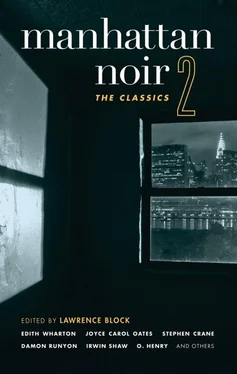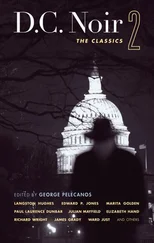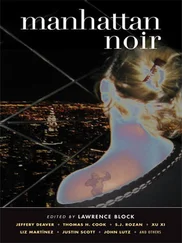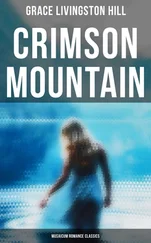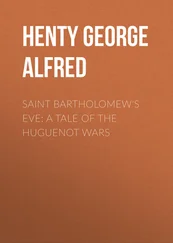Bobbie was the only other stayer. Bracketts flashed an eye for the lad’s hand and saw the nine, eight, six, and five of hearts. Now there are but six hundred and forty-five emotions possible to the human mind, and Bracketts immediately had them all. Under the impression that he had finished his cigar, he took it from his mouth and tossed it toward the grate without turning his eyes to follow its flight.
There happened to be a complete silence around the green-clothed table. Spuytendyvil was studying his hand with a kind of contemptuous smile, but in his eyes there perhaps was to be seen a cold, stern light expressing something sinister and relentless.
Young Bob sat as he had sat. As the pause grew longer, he looked up once inquiringly at Spuytendyvil.
The old man reached for a white chip. “Well, mine are worth about that much,” said he, tossing it into the pot. Thereupon he leaned back comfortably in his chair and renewed his stare at the five straight diamonds. Young Bob extended his hand leisurely toward his stack. It occurred to Bracketts that he was smoking, but he found no cigar in his mouth.
The lad fingered his chips and looked pensively at his hand. The silence of those moments oppressed Bracketts like the smoke from a conflagration.
Bobbie Cinch continued for some moments to coolly observe his cards. At last he breathed a little sigh and said, “Well, Mr. Spuytendyvil, I can’t play a sure thing against you.” He threw in a white chip. “I’ll just call you. I’ve got a straight flush.” He faced down his cards.
Old Spuytendyvil’s roar of horror and rage could only be equaled in volume to a small explosion of gasolene. He dashed his cards upon the table. “There!” he shouted, glaring frightfully at Bobbie. “I’ve got a straight flush, too! And mine is Jack high!”
Bobbie was at first paralyzed with amazement, but in a moment he recovered and apparently observing something amusing in the situation he grinned.
Archie Bracketts, having burst his bond of silence, yelled for joy and relief. He smote Bobbie on the shoulder. “Bob, my boy,” he cried exuberantly, “you’re no gambler but you’re a mighty good fellow, and if you hadn’t been you would be losing a good many dollars this minute.”
Old Spuytendyvil glowered at Bracketts. “Stop making such an infernal din, will you, Archie,” he said morosely. His throat seemed filled with pounded glass. “Pass the whiskey.”
The furnished room
by O. Henry
Lower West Side
(Originally published in 1906)
Restless, shifting, fugacious as time itself is a certain vast bulk of the population of the red brick district of the lower West Side. Homeless, they have a hundred homes. They flit from furnished room to furnished room, transients forever — transients in abode, transients in heart and mind. They sing “Home, Sweet Home” in ragtime; they carry their lares et penates in a bandbox; their vine is entwined about a picture hat; a rubber plant is their fig tree.
Hence the houses of this district, having had a thousand dwellers, should have a thousand tales to tell, mostly dull ones, no doubt; but it would be strange if there could not be found a ghost or two in the wake of all these vagrant guests.
One evening after dark a young man prowled among these crumbling red mansions, ringing their bells. At the twelfth he rested his lean hand-baggage upon the step and wiped the dust from his hatband and forehead. The bell sounded faint and far away in some remote, hollow depths.
To the door of this, the twelfth house whose bell he had rung, came a housekeeper who made him think of an unwholesome, surfeited worm that had eaten its nut to a hollow shell and now sought to fill the vacancy with edible lodgers.
He asked if there was a room to let.
“Come in,” said the housekeeper. Her voice came from her throat; her throat seemed lined with fur. “I have the third-floor back, vacant since a week back. Should you wish to look at it?”
The young man followed her up the stairs. A faint light from no particular source mitigated the shadows of the halls. They trod noiselessly upon a stair carpet that its own loom would have forsworn. It seemed to have become vegetable; to have degenerated in that rank, sunless air to lush lichen or spreading moss that grew in patches to the staircase and was viscid under the foot like organic matter. At each turn of the stairs were vacant niches in the wall. Perhaps plants had once been set within them. If so they had died in that foul and tainted air. It may be that statues of the saints had stood there, but it was not difficult to conceive that imps and devils had dragged them forth in the darkness and down to the unholy depths of some furnished pit below.
“This is the room,” said the housekeeper, from her furry throat. “It’s a nice room. It ain’t often vacant. I had some most elegant people in it last summer — no trouble at all, and paid in advance to the minute. The water’s at the end of the hall. Sprowls and Mooney kept it three months. They done a vaudeville sketch. Miss B’retta Sprowls — you may have heard of her — oh, that was just the stage names — right there over the dresser is where the marriage certificate hung, framed. The gas is here, and you see there is plenty of closet room. It’s a room everybody likes. It never stays idle long.”
“Do you have many theatrical people rooming here?” asked the young man.
“They comes and goes. A good proportion of my lodgers is connected with the theatres. Yes, sir, this is the theatrical district. Actor people never stays long anywhere. I get my share. Yes, they comes and they goes.”
He engaged the room, paying for a week in advance. He was tired, he said, and would take possession at once. He counted out the money. The room had been made ready, she said, even to towels and water. As the housekeeper moved away he put, for the thousandth time, the question that he carried at the end of his tongue.
“A young girl — Miss Vashner — Miss Eloise Vashner — do you remember such a one among your lodgers? She would be singing on the stage, most likely. A fair girl, of medium height and slender, with reddish, gold hair and a dark mole near her left eyebrow.”
“No, I don’t remember the name. Them stage people has names they change as often as their rooms. They comes and they goes. No, I don’t call that one to mind.”
No. Always no. Five months of ceaseless interrogation and the inevitable negative. So much time spent by day in questioning managers, agents, schools and choruses; by night among the audiences of theatres from all-star casts down to music halls so low that he dreaded to find what he most hoped for. He who had loved her best had tried to find her. He was sure that since her disappearance from home this great, water-girt city held her somewhere, but it was like a monstrous quicksand, shifting its particles constantly, with no foundation, its upper granules of to-day buried to-morrow in ooze and slime.
The furnished room received its latest guest with a first glow of pseudo-hospitality, a hectic, haggard, perfunctory welcome like the specious smile of a demirep. The sophistical comfort came in reflected gleams from the decayed furniture, the ragged brocade upholstery of a couch and two chairs, a foot-wide cheap pier glass between the two windows, from one or two gilt picture frames and a brass bedstead in a corner.
The guest reclined, inert, upon a chair, while the room, confused in speech as though it were an apartment in Babel, tried to discourse to him of its divers tenantry.
A polychromatic rug like some brilliant-flowered rectangular, tropical islet lay surrounded by a billowy sea of soiled matting. Upon the gay-papered wall were those pictures that pursue the homeless one from house to house — The Huguenot Lovers, The First Quarrel, The Wedding Breakfast, Psyche at the Fountain. The mantel’s chastely severe outline was ingloriously veiled behind some pert drapery drawn rakishly askew like the sashes of the Amazonian ballet. Upon it was some desolate flotsam cast aside by the room’s marooned when a lucky sail had borne them to a fresh port — a trifling vase or two, pictures of actresses, a medicine bottle, some stray cards out of a deck.
Читать дальше
